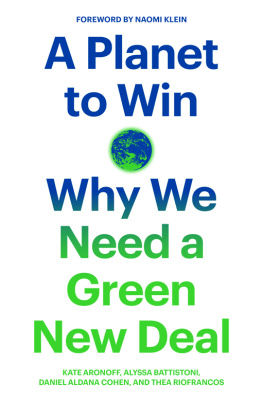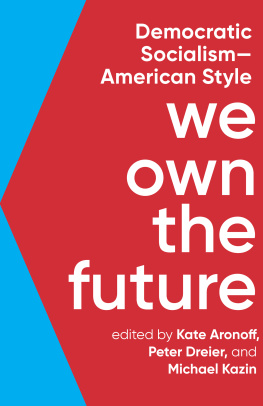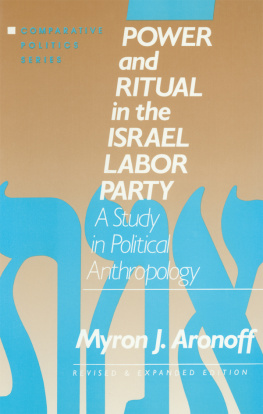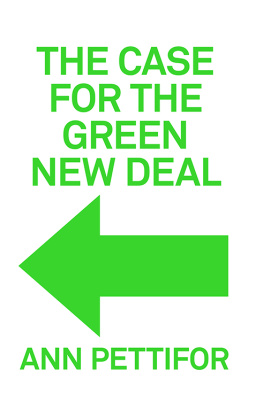Kate Aronoff - A Planet to Win: Why We Need a Green New Deal
Here you can read online Kate Aronoff - A Planet to Win: Why We Need a Green New Deal full text of the book (entire story) in english for free. Download pdf and epub, get meaning, cover and reviews about this ebook. publisher: Verso, genre: Politics. Description of the work, (preface) as well as reviews are available. Best literature library LitArk.com created for fans of good reading and offers a wide selection of genres:
Romance novel
Science fiction
Adventure
Detective
Science
History
Home and family
Prose
Art
Politics
Computer
Non-fiction
Religion
Business
Children
Humor
Choose a favorite category and find really read worthwhile books. Enjoy immersion in the world of imagination, feel the emotions of the characters or learn something new for yourself, make an fascinating discovery.
- Book:A Planet to Win: Why We Need a Green New Deal
- Author:
- Publisher:Verso
- Genre:
- Rating:5 / 5
- Favourites:Add to favourites
- Your mark:
- 100
- 1
- 2
- 3
- 4
- 5
A Planet to Win: Why We Need a Green New Deal: summary, description and annotation
We offer to read an annotation, description, summary or preface (depends on what the author of the book "A Planet to Win: Why We Need a Green New Deal" wrote himself). If you haven't found the necessary information about the book — write in the comments, we will try to find it.
Kate Aronoff: author's other books
Who wrote A Planet to Win: Why We Need a Green New Deal? Find out the surname, the name of the author of the book and a list of all author's works by series.
A Planet to Win: Why We Need a Green New Deal — read online for free the complete book (whole text) full work
Below is the text of the book, divided by pages. System saving the place of the last page read, allows you to conveniently read the book "A Planet to Win: Why We Need a Green New Deal" online for free, without having to search again every time where you left off. Put a bookmark, and you can go to the page where you finished reading at any time.
Font size:
Interval:
Bookmark:
This eBook is licensed to nick herzberg, nick@herzberg.co.uk on 03/21/2020
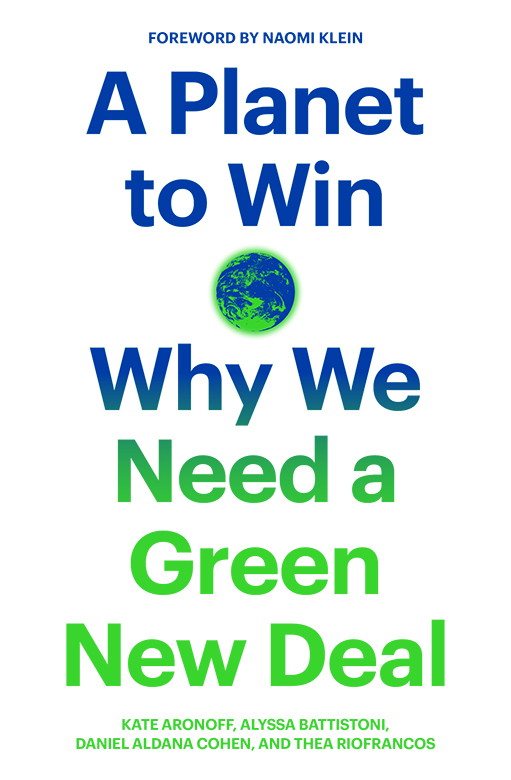
This eBook is licensed to nick herzberg, nick@herzberg.co.uk on 03/21/2020

The Jacobin series includes short interrogations of politics, economics, and culture from a socialist perspective, as an avenue to radical political practice. The books offer critical analysis and engagement with the history and ideas of the Left in accessible and popular form.
The series is a collaboration between Verso Books and Jacobin magazine, which is published quarterly in print and online at jacobinmag.com.
Other titles in this series available from Verso Books:
Utopia or Bust by Benjamin Kunkel
Playing the Whore by Melissa Gira Grant
Strike for America by Micah Uetricht
The New Prophets of Capital by Nicole Aschoff
Four Futures by Peter Frase
Class War by Megan Erickson
Building the Commune by George Ciccariello-Maher
The Peoples Republic of Walmart
by Leigh Phillips and Michal Rozwroski
All-American Nativism by Daniel Denvir
Capital City by Samuel Stein
Red State Revolt by Eric Blanc
Without Apology by Jenny Brown
This eBook is licensed to nick herzberg, nick@herzberg.co.uk on 03/21/2020
ALYSSA BATTISTONI,
DANIEL ALDANA COHEN,
and THEA RIOFRANCOS

This eBook is licensed to nick herzberg, nick@herzberg.co.uk on 03/21/2020
First published by Verso 2019
The collection Verso 2019
The contributions The contributors 2019
Foreword Naomi Klein 2019
All rights reserved
The moral rights of the authors have been asserted
1 3 5 7 9 10 8 6 4 2
Verso
UK: 6 Meard Street, London W1F 0EG
US: 20 Jay Street, Suite 1010, Brooklyn, NY 11201
versobooks.com
Verso is the imprint of New Left Books
ISBN-13: 978-1-78873-831-6
ISBN-13: 978-1-78873-833-0 (US EBK)
ISBN-13: 978-1-78873-832-3 (UK EBK)
British Library Cataloguing in Publication Data
A catalogue record for this book is available from the British Library
Library of Congress Cataloging-in-Publication Data
A catalog record for this book is available from the Library of Congress
Typeset in Monotype Fournier by Hewer Text UK Ltd, Edinburgh
Printed in the UK by CPI Group (UK) Lrd, Croydon CR0 4YY
This eBook is licensed to nick herzberg, nick@herzberg.co.uk on 03/21/2020
There is nowhere to go now but forward. But which way is forward?
Roland Wank, chief architect, Tennessee Valley Authority, 1941
This eBook is licensed to nick herzberg, nick@herzberg.co.uk on 03/21/2020
This eBook is licensed to nick herzberg, nick@herzberg.co.uk on 03/21/2020
The Green New Deal burst onto the political stage when organizers held a sit-in in the office of House Speaker Nancy Pelosi (D-CA) last fall. She dismissed the idea as a Green Dream, or whatever, but organizers were unfazed. They shot back that the Green New Deal was indeed a dream, a badly needed one about what organized and focused people are capable of accomplishing in the face of a crisis that threatens the habitability of our home. Given how radically and rapidly our societies need to change if we are to avert full-blown climate catastrophe (and given the prevalence of ecological doom and despair), sharing some big dreams about a future in which we do not descend into climate barbarism seemed like a very good place to start.
The interplay between lofty dreams and earthly victories has always been at the heart of moments of deep progressive transformation. In the United States, the breakthroughs won for workers and their families after the Civil War and during the Great Depression, as well as for civil rights and the environment in the sixties and early seventies, were not just responses to crises, demanded from below. They were also the products of dreams of very different kinds of societies, dreams invariably dismissed as impossible and impractical at the time. What set these moments apart was not the presence of crises (which our history has never lacked), but rather that they were times of rupture when the utopian imagination was unleashedtimes when people dared to dream big, out loud, in public, together. For instance, the Gilded Age strikers of the late nineteenth century, enraged by the enormous fortunes being amassed off the backs of repressed laborers, were inspired by the Paris Commune, when the working people of Paris took over the governing of their city for months. They dreamed of a cooperative commonwealth, a world where work was but one element of a well-balanced life, with plenty of time for leisure, family, and art. In the lead-up to the original New Deal, working-class organizers were versed not only in Marx but also in W.E.B. Du Bois, who had a vision of a pan-working-class movement that could unite the downtrodden to transform an unjust economic system. It was the civil rights movements transcendent dreamwhether articulated in the oratory of Martin Luther King Jr. or in the vision of the Student Nonviolent Coordinating Committeethat created the space for, and inspired, the grassroots organizing that in turn led to tangible wins. A similar utopian fervor in the late sixties and early seventiesemerging out of the countercultural upheaval, when young people were questioning just about everythinglaid the groundwork for feminist, lesbian and gay, and environmental breakthroughs.
By the time the 2008 financial fiasco was unfolding, that utopian imagination had largely atrophied. Moral outrage poured out against the banks and the bailouts and the austerity that was sure to follow. Yet even as rage filled the streets and the squares, generations who had grown up under neoliberalisms vice grip struggled to picture something, anything, other than what they had always known. Science fiction hasnt been much help, either. Almost every vision of the future that we get from best-selling novels and big-budget Hollywood films takes some kind of ecological and social apocalypse for granted. Its almost as if a great many of us have collectively stopped believing that there is a future, let alone that it could be better, in many ways, than the present.
The climate movement has suffered from this imaginative asphyxiation for many decades. The mainstream green movement has been very good at describing the threat we face in harrowing detail. But when it came to telling the truth about the depth of systemic change required to avert the worst outcomes, there has long been a profound a mismatch. Change your lightbulbs, we were told for a decade. Plant a tree when you fly. Turn your lights off for an hour a year. The name of the game was always the same: show people how they can change without changing much of anything at all.
As this urgent and exciting book makes abundantly clear, that era of pseudo change is definitively over. The Green New Deal has a long way to go before it constitutes an actual plan to get to zero emissions while battling rampant economic inequality and systemic racial and gender exclusions. But it starts with those goals and puts a whole lot of big and bold ideas on the table to get us planning, organizing, and dreaming in our communities and workplaces. Many commentators have of course declared that none of this is possible. Its too ambitious. Too much. Too late. But that overlooks the crucial fact that none of this began in 2018. The ground for this moment had been prepared for decades outside the headlines, with models for community-owned and community-controlled renewable energy; with justice-based transitions that make sure no worker is left behind; with a deepening analysis of the intersections between systemic racism, armed conflict, and climate disruption; with improved green technology and breakthroughs in clean public transit; with the thriving fossil fuel divestment movement; with model legislation driven by the climate justice movement that shows how carbon taxes can fight racial and gender exclusion; and much more. What had been missing is only the top-level political power to roll out the best of these models all at once, with the focus and velocity that both science and justice demand. That is the great promise of a comprehensive Green New Deal in the largest economy on earth. As is detailed in the pages to come, the original New Deal was rife with failings and exclusions. But it remains a useful touchstone for showing how every sector of life, from forestry to education to the arts to housing to electrification, can be transformed under the umbrella of a single, society-wide mission. And unlike previous attempts to introduce climate legislation, the Green New Deal has the capacity to mobilize a truly intersectional mass movement behind itnot despite its sweeping ambition, but precisely because of it. As the fossil fuel industry ramps up its attacks, the serious center will craft whittled-down countermeasures that preserve only the most narrowly defined of climate policies. The promise of the kind of radical Green New Deal described in this book is in rejecting both, pushing not just for the rapid, far-reaching and unprecedented changes in all aspects of society that the Intergovernmental Panel on Climate Change has urged, but for us to treat the climate crisis as an opportunity to build an altogether fairer, more leisurely, and more democratic world on the other end. We have a hell of a lot of work to do. What will sustain us in the difficult years to come is a dream of the future that is not just better than ecological collapse, but a whole lot better than the barbaric ways our system treats human and nonhuman life right now.
Font size:
Interval:
Bookmark:
Similar books «A Planet to Win: Why We Need a Green New Deal»
Look at similar books to A Planet to Win: Why We Need a Green New Deal. We have selected literature similar in name and meaning in the hope of providing readers with more options to find new, interesting, not yet read works.
Discussion, reviews of the book A Planet to Win: Why We Need a Green New Deal and just readers' own opinions. Leave your comments, write what you think about the work, its meaning or the main characters. Specify what exactly you liked and what you didn't like, and why you think so.

